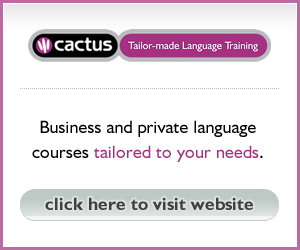The Language Learning Pathway
Sunday, 21st September 2008
The Language Learning Pathway has been written by Cactus, and is based on the Common European Framework specifications. The idea here is to provide you with a clear description of the language skills you will achieve by the end of each level.
These levels will give you an idea of what should be possible at the end of each level of our Part-Time Evening courses in the UK and North America.
Beginner A1.1
By the end of this course you will be able to understand and use:
• Functional vocabulary - familiar everyday expressions and basic phrases; introduce yourself and others and ask and answer questions about personal details such as where you live, people you know and routines; understand basic instructions; cardinal numbers; colours;
• Grammar - present tenses in spoken and written form, to describe your personal interests; write basic sentences, including date and time and place; recognise different parts of speech and word order;
• Pronunciation - individual and blended key sounds and have an idea of regular speech patterns;
• Cultural awareness - the social norms and customs of the target language, understand how to study the language independently (e.g. online, self-study language centres, study groups, etc); understand your learning style.
Beginner Plus A1.2
By the end of this course you will be able to understand and use:
• Functional vocabulary - conversational language about yourself, family and immediate surroundings, interact in a simple way, provided the other person talks slowly and clearly; handle telephone calls;
• Grammar -different grammatical structures (past and present) in spoken and written form, describe simple narratives;
• Pronunciation - aspects of connected speech and develop appropriate intonation to express yourself clearly in short conversational interactions;
• Cultural awareness - the body language and gestures of the target language.
Elementary A2
By the end of this course you will be able to understand and use:
• Functional vocabulary - in familiar and routine matters; understand sentences and frequently used expressions related to familiar areas, (e.g. basic personal and family information, shopping, local geography, employment);
• Grammar -different grammatical structures (past, present and future); describe in simple terms aspects your background, immediate environment and matters in areas of immediate need; talk about ideas and plans;
• Pronunciation - appropriate intonation to express yourself accurately in social conversational interactions;
• Cultural awareness - common idiomatic expressions of the target language.
Lower Intermediate B1
By the end of this course you will be able to understand and use:
• Functional vocabulary - to deal with most situations likely to arise whilst travelling in an area where the language is spoken; understand the main points on familiar matters regularly encountered in work, school, leisure, etc; conduct conversations on topics that you are unprepared for;
• Grammar - more complex grammatical structures to express aspect and modality; produce connected text on topics, which are familiar, or of personal interest; describe experiences and events, dreams, hopes & ambitions and briefly give reasons and explanations for opinions and plans;
• Pronunciation - the appropriate intonation in social and business conversational interactions;
• Cultural awareness - some colloquialisms of the target language.
Intermediate B2
By the end of this course you will be able to understand and use:
• Functional vocabulary - with a degree of fluency and spontaneity that makes regular interaction with native speakers quite possible without strain for either party; understand the main ideas of complex text on both concrete and abstract topics, including technical discussions in my field of specialisation; understand the main ideas expressed on television and radio;
• Grammar - more complex grammatical structures; produce clear, detailed text on a wide range of subjects and explain a viewpoint on a topical issue giving the advantages and disadvantages of various options;
• Pronunciation - strategies to negotiate and clarify your meaning;
• Cultural awareness - some idioms and colloquialisms of the target language.
Upper Intermediate C1
By the end of this course you will be able to understand and use:
• Functional vocabulary - use language flexibly and effectively for social, academic and professional purposes; produce clear, well-structured, detailed text on complex subjects, showing controlled use of organisational patterns, connectors and cohesive devices; understand nearly everything you hear, see or read on television or the radio;
• Grammar - a wide range of demanding, longer texts, and recognise implicit meaning; be familiar with complex tenses, aspects and modality;
• Pronunciation - expressions to communicate fluently and spontaneously without unnatural pauses and hesitation;
• Cultural awareness - most idiomatic expressions of the target language.
Advanced C2
By the end of this course you will be able to understand and use:
• Functional vocabulary - understand virtually everything heard or read; write texts in an appropriate style; understand literary and specialised texts;
•Grammar - information from different spoken and written sources, reconstructing and summarising arguments and accounts in a coherent presentation; understand study skills and strategies needed to improve your language level;
• Pronunciation - identify and understand different dialects and regional differences in the target language; identify linguistic differences between my level of the target language and a native speaker; express yourself spontaneously, very fluently and precisely, differentiating finer shades of meaning even in more complex situations; minimal accent;
• Cultural awareness - the social, political and business etiquette of the target language.
Tags: english, french, spanish, german, italian, part-time evening course, united kingdom
Posted by Cactus under Types of Courses,
Permalink
